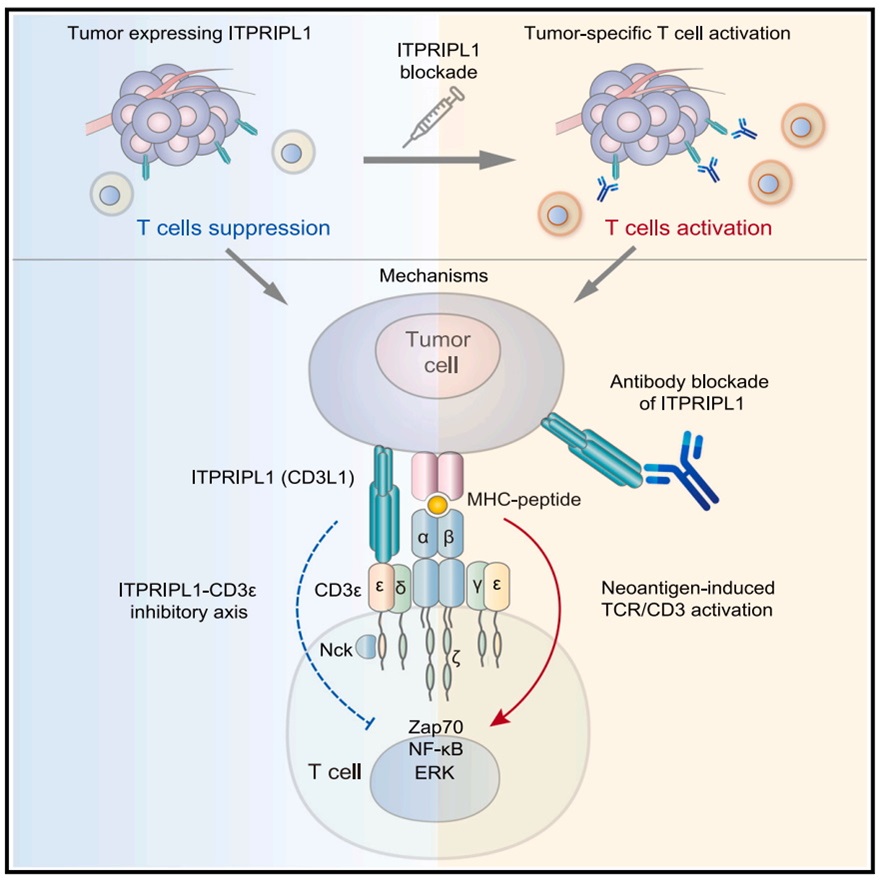Jie Xu's team from Fudan University discovered CD3 ligand 1 as target for cancer imunotherapy
Source:Jie Xu
2024-05-15
The emergence of immune checkpoint blockade (ICB) has brought profound changes to clinical cancer treatment, but a large number of patients still respond poorly to existing immunotherapy. Therefore, the search for new and effective immunotherapy targets has become a key issue that global scholars attach great importance to. In the process of T cell-mediated anti-tumor immune response, the T cell receptor (TCR)-CD3 complex plays a central and indispensable role. Previous studies have mostly focused on the effect of MHC, an activating ligand, on TCR/CD3, and based on this, anti-tumor therapies with engineered TCR/CD3 have been developed, including TCR-T, CAR-T and other drugs. However, there are few reports on the research of TCR/CD3 natural inhibitory ligands.
In a recent Cell paper, the research team led by Dr. Jie Xu from Institutes of Biomedical Sciences, Fudan University has shed light on CD3L1 (CD3 ligand 1), revealing it as a crucial mechanism in tumor immune evasion, particularly in patients who respond poorly to PD-1/PD-L1 inhibitory therapies. The expression of CD3L1 (or ITPRIPL1) exhibits several intriguing characteristics, including its mutual exclusivity with PD-L1 expression in most tumors, its prevalence in tumors resistant to PD-1/PD-L1 blockade, and enrichment in immune-privileged organs. These features suggest alternative immune evasion pathways and highlight the role of CD3L1 in maintaining immune privilege.

Furthermore, knockout studies in mice have demonstrated that CD3L1 plays a pivotal role in maintaining immune privilege, as its absence led to substantial autoimmune reactions in the testis. Additionally, a wide range of tumors express high levels of CD3L1, hindering T cell activity and enabling tumor immune evasion. The interaction of CD3L1 with CD3ε, a receptor, results in a sustained binding of Nck to the intracellular domain of CD3ε. This binding competitively inhibits the recruitment and phosphorylation of Zap70, effectively dampening T cell activation in its initial stages.
Previous research on TCR/CD3 receptor complex focused on TCR as the sole receptor for MHC ligands, while CD3 was thought to merely transduce TCR signals. This study reveals the existence of natural ligands for CD3, challenging the TCR-dominant model and introducing a bipolar mode where both TCR and CD3 can receive natural input signals. This groundbreaking discovery could significantly impact tumor immunotherapy drug development.
Dr. Jie Xu, a researcher of Institutes of Biomedical science, Fudan University, is the corresponding author of this paper. BioTroy Therapeutics participated in the collaborative research. This project was funded by key projects of the National Natural Science Foundation of China, national science and technology innovation leading talents research funds, Shanghai Science and Technology Innovation Action Plan, Fudan University Start-up Foundation.
Links: https://linkinghub.elsevier.com/retrieve/pii/S0092-8674(24)00310-6
In a recent Cell paper, the research team led by Dr. Jie Xu from Institutes of Biomedical Sciences, Fudan University has shed light on CD3L1 (CD3 ligand 1), revealing it as a crucial mechanism in tumor immune evasion, particularly in patients who respond poorly to PD-1/PD-L1 inhibitory therapies. The expression of CD3L1 (or ITPRIPL1) exhibits several intriguing characteristics, including its mutual exclusivity with PD-L1 expression in most tumors, its prevalence in tumors resistant to PD-1/PD-L1 blockade, and enrichment in immune-privileged organs. These features suggest alternative immune evasion pathways and highlight the role of CD3L1 in maintaining immune privilege.

Furthermore, knockout studies in mice have demonstrated that CD3L1 plays a pivotal role in maintaining immune privilege, as its absence led to substantial autoimmune reactions in the testis. Additionally, a wide range of tumors express high levels of CD3L1, hindering T cell activity and enabling tumor immune evasion. The interaction of CD3L1 with CD3ε, a receptor, results in a sustained binding of Nck to the intracellular domain of CD3ε. This binding competitively inhibits the recruitment and phosphorylation of Zap70, effectively dampening T cell activation in its initial stages.
Previous research on TCR/CD3 receptor complex focused on TCR as the sole receptor for MHC ligands, while CD3 was thought to merely transduce TCR signals. This study reveals the existence of natural ligands for CD3, challenging the TCR-dominant model and introducing a bipolar mode where both TCR and CD3 can receive natural input signals. This groundbreaking discovery could significantly impact tumor immunotherapy drug development.
Dr. Jie Xu, a researcher of Institutes of Biomedical science, Fudan University, is the corresponding author of this paper. BioTroy Therapeutics participated in the collaborative research. This project was funded by key projects of the National Natural Science Foundation of China, national science and technology innovation leading talents research funds, Shanghai Science and Technology Innovation Action Plan, Fudan University Start-up Foundation.
Links: https://linkinghub.elsevier.com/retrieve/pii/S0092-8674(24)00310-6


